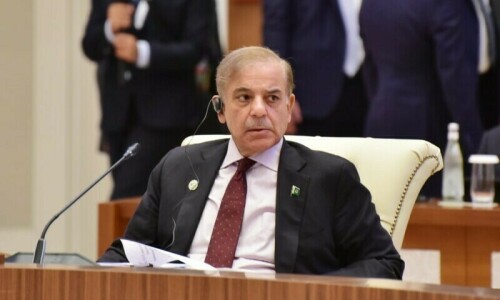 ISLAMABAD, Dec 29: Life remained crippled in the federal capital on the third consecutive day after the assassination of PPP chairperson Benazir Bhutto, as shops and markets remained closed and ordinary citizens and the business community worried about their lives and property.
ISLAMABAD, Dec 29: Life remained crippled in the federal capital on the third consecutive day after the assassination of PPP chairperson Benazir Bhutto, as shops and markets remained closed and ordinary citizens and the business community worried about their lives and property.
Car owners were the worst affected, as most of the CNG stations and petrol pumps remained closed in the absence of any security provided by the state. CNG stations had been fenced off by the owners due to fear of attacks by angry PPP workers.
Car owners had to inquire from friends and relatives whether the CNG stations or petrol pumps in their areas were opened.
Mohammad Arif, a resident of G-8 Markaz, said he had to drive to Tarnol to fill his CNG kit. Later, he got information that a petrol pump was open in Sector F-10, but then it was too late.
The capital, it seemed, had never seen so many cars locked in the residential parking lots on a working day. People feared that vehicles could be the soft target of the stone-throwing rioters.
“Thank God, my motorbike survived the attack,” observed Mohammad Akhtar after receiving a phone call from his son. He said his son had just informed him that rioters had attacked the same parking lot and set ablaze vehicles in which his bike was parked till just half an hour ago.
Akhtar was lucky. He had to leave on his bike for his working place in Zero Point.
Commuters continued to suffer, as taxis and public transport could not be seen on roads.
The capital’s roads which normally prove too narrow for the ever-growing number of cars seemed too broad and wide on Saturday as vehicles had almost disappeared.
Few taxis spotted at various points of the city were demanding more than double of what they normally charged.
“Today, they can demand Rs200 for a distance for which the normal fare is Rs50,” said Mohammad Asif, a resident of Rawalpindi who works as a security guard in Islamabad. He said he had reached the office on foot on Saturday.
Women and even families with small children could be seen travelling from Rawalpindi to Islamabad via Faizabad on foot.
The taxi drivers said they had to travel to remote petrol and CNG stations outside Islamabad for getting fuel. They said they were justified in charging extra for the additional fuel they consumed and for putting their lives in danger in such a dangerous condition. Reports of sporadic attacks on vehicles in Rawalpindi further added to the fear in the somewhat lifeless and unusually deserted Islamabad. A peculiar fear was visible in the eyes of every pedestrian.
Traffic police remained busy in blocking and re-opening various roads from time to time, particularly the ones connecting the capital with Rawalpindi.
Driving on Murree Road towards the spot where Ms Bhutto was assassinated remained the most daring task.
Main shopping centres and markets here remained closed, while small shops in various pockets of the city were opened. However, they had to be closed every now and then due to threats of attacks from angry rioters.
A Reporter from Pindi adds: While traffic remained off the roads in the city and on Murree Road, life seemed to be returning to normality in the cantonment areas, where the flow of traffic picked up on Saturday.
Traffic on the Mall Road, Haider Road, Bank Road, Kashmir Road and several other roads and streets increased in the afternoon. However, no public transport was seen on these roads.
People suffered a lot in the absence of public transport. Though there was a complete shutterdown in all markets of cantonment areas, a few hotels were opened to serve tea and meals but on a small scale.
The total shutterdown had an impact on every household. The day-to-day shopping of vegetables, fruits, mutton, chicken, bread, eggs, milk and other commodities was severely affected due to the strike.
A few grocery stores and bakeries also opened at scattered areas in the cantonment where big rush of people was witnessed. Likewise, ‘Tandoors’ also remained open at some places to sell bread.
Fruit/vegetable vendors took full advantage of the strike and sold commodities at much higher prices on the plea that the wholesale market was closed. Banana was being sold at Rs50 to Rs60 per dozen, orange at Rs60 per dozen and guva at Rs50 per kg. In the absence of the supply of chicken, poultry sellers sold chicken between the price of Rs90 to Rs100 per kg.













































Dear visitor, the comments section is undergoing an overhaul and will return soon.